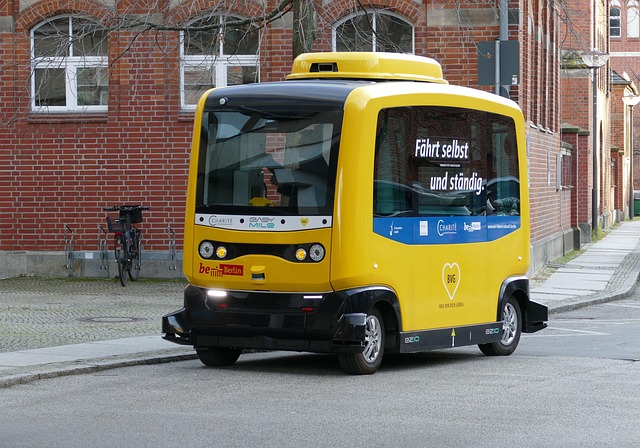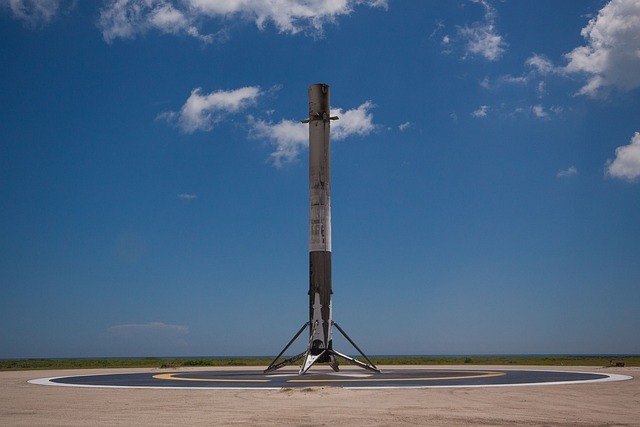Select Autonomous Vehicles (SAVs) revolutionize logistics and transportation with 24/7 efficiency, route optimization, and enhanced safety through advanced sensors and AI. While addressing driver shortages and improving yields, SAVs face regulatory challenges and ethical concerns regarding data privacy and public trust. Successful integration requires global collaboration for unified regulations, ensuring a sustainable future for the industry while mitigating job displacement and access issues.
“The future of logistics is here with the emergence of driverless truck technology. Unlocking immense efficiency, these autonomous vehicles promise to revolutionize the transportation industry. In this comprehensive guide, we explore the potential of Select Autonomous Vehicles for logistics operations. From enhancing safety and transforming regulatory landscapes to shaping the future of freight, discover how self-driving trucks are poised to redefine supply chain management.”
- Unlocking Efficiency: Select Autonomous Vehicles for Logistics
- Tech Revolution: How Self-Driving Trucks Transform Transport
- Safety Measures: Ensuring Secure Operations with Driverless Trucks
- Regulatory Challenges: Navigating Legalities in Autonomous Logistics
- Future of Freight: The Impact and Potential of Driverless Trucking
Unlocking Efficiency: Select Autonomous Vehicles for Logistics

The future of logistics is here with the advent of Select Autonomous Vehicles (SAVs). These innovative machines promise to revolutionize transportation and distribution networks by unlocking unprecedented levels of efficiency. By eliminating the need for human drivers, SAVs can operate 24/7, reducing operational costs and increasing productivity. They are equipped with advanced sensors and AI capabilities that enable them to navigate complex routes, adapt to changing road conditions, and ensure safe cargo transport.
The integration of autonomous vehicles into logistics also brings about significant advantages in terms of safety, sustainability, and reliability. In the agricultural sector, for instance, AI-driven SAVs can enhance crop monitoring and distribution, leading to improved yields and reduced waste. However, as with any new technology, there are challenges to consider, such as regulatory frameworks that need to evolve to accommodate driverless cars. Additionally, addressing ethical concerns surrounding driverless car safety and data privacy is crucial for gaining public trust and ensuring a smooth transition to this transformative logistics paradigm.
Tech Revolution: How Self-Driving Trucks Transform Transport

The future of transportation is here with the rise of self-driving trucks, marking a significant tech revolution in logistics and the auto industry. These Select Autonomous Vehicles (SAVs) are transforming the way goods are moved, promising to disrupt traditional supply chains. With advanced sensors, machine learning algorithms, and sophisticated software, driverless trucks can navigate complex routes, optimize delivery times, and improve overall efficiency.
Driverless car companies are at the forefront of this disruptive tech, investing heavily in research and development. The introduction of SAVs addresses numerous challenges in the logistics sector, including driver shortages, road safety concerns, and reduced operational costs. As autonomous vehicle regulations evolve, these vehicles will become more integrated into everyday life, reshaping urban landscapes and revolutionizing the way we think about transportation networks.
Safety Measures: Ensuring Secure Operations with Driverless Trucks

The introduction of driverless trucks promises a significant shift in logistics and transportation, but safety remains paramount. As autonomous vehicles navigate public roads, sophisticated sensors, cameras, and advanced software are employed to detect and anticipate potential hazards. These systems include collision avoidance mechanisms, lane-keeping aids, and pedestrian detection algorithms, ensuring secure operations.
The future of car ownership may be influenced by the success of these technologies in reducing human error, which is a leading cause of accidents. Furthermore, automation has the potential to lower carbon footprint reduction through efficient routing and optimized loading, aligning with global efforts to combat climate change. However, as we navigate the driverless car ethics landscape, it’s crucial to address data privacy concerns and ensure fair regulations that benefit both industries and consumers alike.
Regulatory Challenges: Navigating Legalities in Autonomous Logistics

The rise of driverless truck logistics presents significant challenges, with regulatory issues topping the list. As technology advances and more companies invest in developing select autonomous vehicles, ensuring safe operations while adhering to legal frameworks becomes a complex task. The future of car ownership and transportation is closely tied to the successful integration of self-driving trucks, which requires a robust regulating autonomous vehicles legal framework for autonomous driving.
Navigating these legalities involves addressing liability concerns, safety standards, and data privacy regulations. With various jurisdictions having different rules and guidelines, creating a uniform regulatory environment for testing and deploying driverless trucks globally is essential. This process demands collaboration between governments, industry experts, and researchers to establish comprehensive laws that keep pace with technological advancements while prioritizing the well-being of road users and the public at large.
Future of Freight: The Impact and Potential of Driverless Trucking

The future of freight logistics is poised for a dramatic shift with the advent of driverless truck technology. As autonomous vehicles continue to evolve and gain traction, the transportation industry is set to experience unprecedented changes. Select Autonomous Vehicles (SAVs) offer the promise of transformative benefits, including increased efficiency, reduced operational costs, and enhanced safety on the roads. By leveraging self-driving technology, these vehicles can navigate complex routes autonomously, optimizing delivery times and minimizing disruptions.
Inclusive mobility solutions that incorporate driverless trucking have the potential to revolutionize global supply chains. The implementation of auto-pilot systems could lead to more predictable and seamless freight movement, addressing current challenges related to driver shortages and logjammed highways. Moreover, considering the ethical dimensions of driverless car operations—such as ensuring equitable access and mitigating potential job displacement—will be crucial in shaping a responsible and sustainable future for both the industry and society at large.
The future of freight logistics is here, and it’s autonomous. As we’ve explored, selecting the right self-driving vehicles offers significant efficiency gains, while advanced technologies ensure safe operations. Despite regulatory challenges, the potential of driverless trucking is undeniable, promising to revolutionize transportation and shape a more efficient, secure future for global logistics.
